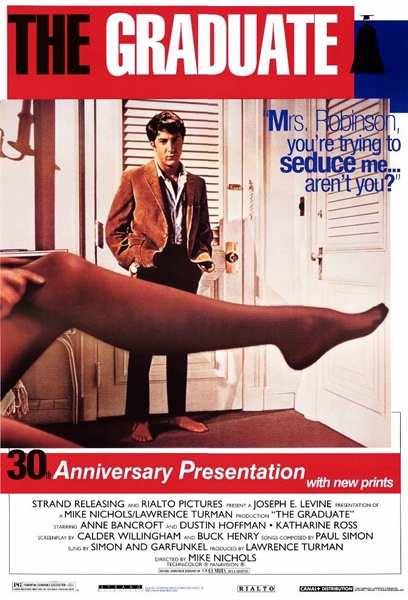 If you cross Nabokov’s scandalous 1950’s masterpiece “Lolita†with Sophocles’ psychoanalytically driven play “Electra†and translate into modern terms, the hybrid will be 1967’s film “The Graduate.â€
If you cross Nabokov’s scandalous 1950’s masterpiece “Lolita†with Sophocles’ psychoanalytically driven play “Electra†and translate into modern terms, the hybrid will be 1967’s film “The Graduate.â€
Aside from landing as number seven in the category of “greatest film of all times on AFI’s 100 years…100 movies,†launching the career of several high-class American actors and receiving a justified Oscar for a best-directed movie, this comedy-drama explores meticulously deep universal themes such as sexual lust, seduction, vulnerability, and the Elektra Complex.
The Germany-born American director Mike Nichols does an excellent job as he takes a 1963 novel by Charles Webb and makes all its printed lines living on the big screen, entertaining the audience, and prompting them to think about the vulnerability of the males and the hidden predatory nature of the females. Since Nichols is no stranger to adapting a printed piece of literature to film versions (previously he has turned the plays of Neil Simon and Edward Albee, “Barefoot in the Park†and “Who’s Afraid of Virginia Wolf,†into motion pictures), there is no wonder that “Mrs. Robinson†has become a common name in the American households.
Mrs. Robinson (Anne Bancroft) is so disillusioned with her protocol marriage to her big-time lawyer husband (she has been forced to tie the knot after accidentally getting pregnant by him) that she is willing to embark on any kind of love adventures in order to quench her unsatisfied sexual desires. When the naïve 21-year old college graduate Benjamin “Ben†Braddock (Dustin Hoffman) enters the picture during a casual gathering by his father’s swimming pool, the prayers of this woman (whose daughter is Ben’s age) seem answered.
Mrs. Robinson is unstoppable of her slightly perverted determination to have the boy all to herself, taking advantage of Ben’s courtesy to drive her home after a pool party. Bancroft’s character strategically asks the seemingly yes-man Ben to help her take off the bra and this tiny instant of intimacy culminates into a stormy love affair amid the Robinsons’ own master bedroom and chambers in fancy hotels. Whereas Mrs. Robinson is definitely the penetrating side in this quite immoral sexual adventure, Ben casts the image of a young rabbit having fallen prey to a cunning vixen. The vulnerable 21-year old has his own battles to hold the front at: his post-college future is still unclear; the nothing-suspecting Mr. Robinson basically forces him to date his daughter Elaine (Katharine Ross); he has to do his best to make sure nobody discovers what is going on, etc.
His inexperience-marred life turns into a emotional roller coaster: he deliberately sabotages his courting of Elaine by taking the nubile to a striptease club so that he can remain faithful to her mother, only to take Mr. Robinson’s utter wrath when the affair comes to light and to witness Elaine dumping him for the snobbish medical student Carl (Brian Avery) in the middle of the San Francisco Zoo.
Yes, Ben feels like a pathetic loser, more pathetic than the lone monkey looking at him sadly until the day he crashes the young Miss Robinson’s wedding, ferociously beats the groom with the cross (what a blasphemy!) and literally steals the bride. The final scene of the disheveled Ben and Elaine in her white wedding dress riding the city bus out of breath yet glowing with happiness shows there must be a reason for the third line in “Boy gets girl. Boy loses girl. Boy gets girl.†comedy structure.
Since Dustin Hoffman is stereotypized in the portrayals of vulnerable characters easily manipulated by women (“The Midnight Cowboy,†“Kramer vs. Kramerâ€), the role of Ben fits him perfectly. As a matter of fact, his performance in “The Graduate†is Hoffman’s breakthrough on the big screen and also a prelude to his later appearances as the best friend of a male prostitute in “The Midnight Cowboy†opposite Jon Voight and as a butter-fingered single father in “Kramer vs. Kramer†opposite Meryl Streep.
For the latter movie, he won his first Oscar.
His onscreen seducer/female manipulator Anne Bancroft plays her character with a certain degree of theatricality, most likely acquired from Bancroft’s stints on Broadway. There is something that really belongs to the stage both in the firm posture of her figure (she is slightly towering over Hoffman) and the piercing sense of seduction in her deep black Italian eyes.
It is, namely, this theatricality that makes the onscreen romance believably scandalous, despite the fact that in real life Anne Bancroft is only a few years older than Dustin Hoffman.
Yes, the late Bancroft knows how to play with classiness for her film debut is opposite not anybody else but Merilyn Monroe in “Don’t Bother to Knock†(1952). Her (Bancroft’s) appearance is the perfect foil for Katharine Ross air of innocence and naïveté. The relative newcomer Ross (“Butch Cassidy and the Sundance Kidâ€) is so good at portraying the goody-goody daddy’s girl Elaine that it is shocking to even think that she could be only nine years younger than her onscreen mother Bancroft. She should have won the Academy Award for a Best Supporting Actress.
In psychoanalytical terms, the love triangle Mrs. Robinson-Ben-Elaine forms a re-definition of the Elektra Complex.
If “Lolita†were to be re-written with reversed gender roles, Ben would be the perfect male substitute for the main heroine. If the typical comedy recipe “Boy gets girl. Boy loses girl. Boy gets girl.†needed a blueprint, “The Graduate†would qualify. That’s why this film is so unique.

Leave a Reply